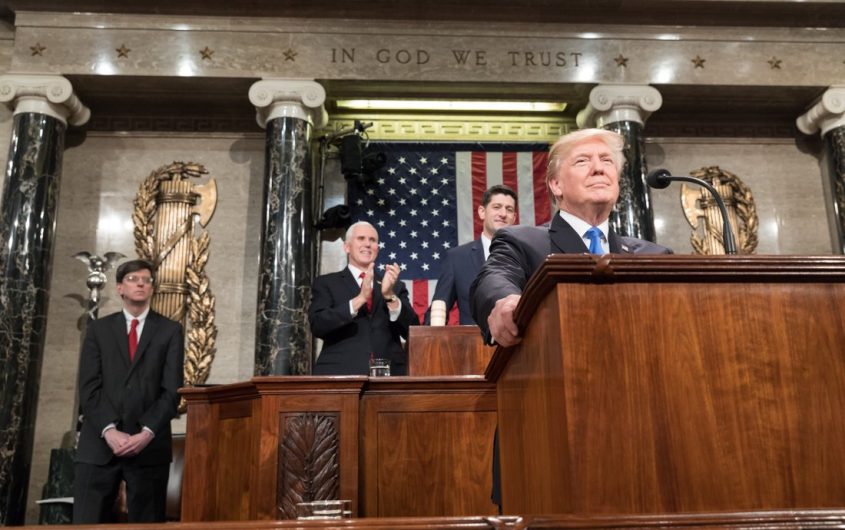
Official White House Photo by Shealah Craighead/Getty Images
Discussing Transatlantic Partnership at the American-German Situation Room

Steven Höfner
Konrad Adenauer Stiftung
Steven Höfner was an American-German Situation Room Fellow in February-March 2018.
He is Desk Officer for European Affairs and North America in the Department for Europe and North America at the Konrad Adenauer Stiftung (KAS) in Berlin. Starting in January 2016 as a speechwriter for the Chairman of KAS, he shortly after assumed responsibility as a Desk Officer for the KAS offices in Brussels. Since April 2017, he also oversees the work of KAS in the United States and Canada. He gained work experience at the office of (by then MEP) Dr. Hans-Gert Pöttering in Brussels.
He holds an MA in Governance and Public Policy from the Technical University of Darmstadt and received his BA in European Studies from the University of Osnabrück. During his studies, he spent semesters at ESCEM in Poitiers and at the University of Florence.
As a fellow in the American-German Situation Room, I sought to learn as much as possible about the approach and direction of the Trump administration. In discussions with various experts, I focused on U.S. security strategy regarding Europe and its neighborhood, trade policy, energy and environmental policy, as well as the opportunities and challenges that digitization might have for the economy and the job market. This article highlights some of my findings and discussions.
Foreign and Security Policy
Since the election of Donald Trump as President of the United States, much has been said and written in Germany about the ruptures and unpredictability of U.S. foreign and security policy. The U.S., according to the widespread view, would withdraw from the international order and make abrupt changes in key issues. In the meantime, the White House has completed a series of strategic processes and published the results in the form of policy documents (the National Security Strategy and the National Defense Strategy). The really surprising thing about all of these documents is that they describe a fairly conventional American foreign and security policy to which Germany and other European partners have become accustomed over the past decades. The security and defense strategies are describing a political world in which the U.S. and its allies are threatened by revisionist powers (China and Russia), rogue states, and terrorism. According to the strategy, the U.S. continues to see itself as a global leader whose political and military commitment is needed to effectively counter these threats. The experts I spoke with shared this view. Obama may have proclaimed these principles in a more compatible way with Germany and Europe, but in substance they were the same. The fact that the strategic principles of Trump’s foreign policy are not new certainly does not mean that there is no potential for transatlantic conflict. The continuing neglected treatment of the United Nations by the U.S. administration contradicts the articulated interests of Germany and other European partners. In addition, the unpredictable “Trump factor” persists. That was made clear by almost all experts and interviewees during my stay.
Trade Policy
Trade policy is one of the few topics in which President Trump has long shown consistent positions. Experts considered trade policy to be the topic most often used by Trump to abandon traditional Republican positions. Since Trump’s inauguration, trade policy has thus opened a big gap between establishment Republicans and the president. Whereas President Trump’s first year of trade policy was characterized by symbolic statements (in particular the NAFTA renegotiations and the termination of the TPP agreement), measures taken at the beginning of his second year have a larger impact on the business environment (high tariffs on aluminum and steel). The announcements made and measures taken so far are evidence of two main lines of Trump’s thinking: First, international trade is a zero-sum game in which only one side can win. Second, bilateral negotiations are preferable to more complex and multi-state formats. In particular, Germany and China with their large trade surpluses are at the focus of attention. However, the direct opportunities for action by the president are limited in the bilateral framework. The experts I spoke with assume that tariffs or import quotas will have no impact on bilateral trade balances. The deciding factor is rather the investment behavior of the country. Here, Trump has set a new course by lowering corporate taxes and hence increasing incentives to reinvest corporate profits within the United States. In doing so, he is entering a tax competition with the European Union.
Climate Change and Energy
During his presidential campaign, Trump promised to withdraw the United States from the Paris Agreement on climate change and to repeal the environmental legislation implemented under President Obama. The aim is to create jobs and produce low-cost energy by expanding the domestic production of fossil fuels. Since assuming office, Trump has been working at full throttle to implement these promises. While strategies for achieving U.S. energy independence are in line with the Republican establishment, his energy policy barely reflects the goals of the international community. Beyond the political symbolism of President Trump’s withdrawal from the Paris Agreement, the short-term and longer-term effects could be marginal. First, the withdrawal can only take effect after November 2020, when the next U.S. presidential elections take place. Second, many U.S. states and energy and manufacturing companies will continue to expand renewable energy and insist on environmental regulations. California and other states are trying to build alliances with each other and with influential industry groups to challenge the Trump administration. Third, President Trump’s policies have triggered various counter-reactions at the community and grassroots level. Even some of the big oil and gas companies have forged new coalitions for some eco-friendly reforms, as they will have to change as the global energy supply limits fossil fuels.
Digital Transformation
Finally, the digital transformation is affecting the world of business and employment. While some experts promote the creation of new jobs, critics see a polarization of labor markets and the elimination of many jobs in manufacturing, services, and agriculture. But all experts agreed that the fourth industrial revolution is clearly distinguishable from previous industrialization waves (steam power, electrification, automation) in terms of speed and force. It is thus not a purely technical, but a deeply political phenomenon that needs to be shaped. The dark elements of a hyper-wired world, such as cyberattacks, data espionage, or private and state surveillance, are already clearly emerging today. Ultimately, these tendencies require a value-based political response and very specific rules, for example with regard to labor and competition law, data sovereignty, and ethics. The discussion among digital experts made clear that different approaches exist on both sides of the Atlantic toward the topic of “digitization,” as well as economic, political, and cultural differences.
My stay in Washington at the American-German Situation Room gave me an excellent environment to study the political debate in the U.S. and truly helped to shed light on the complex transatlantic partnership.
I am grateful for the experience at the American-German Situation Room in February and March 2018. Participation at this truly valuable program allowed me to move into an office at the German Marshall Fund (GMF) in the heart of Washington, DC, and gave me access to the GMF and AGI networks, as well as the opportunity to engage in numerous meetings with exciting discussion partners. Thanks also to the Konrad Adenauer Stiftung in Washington, DC, for their support.








